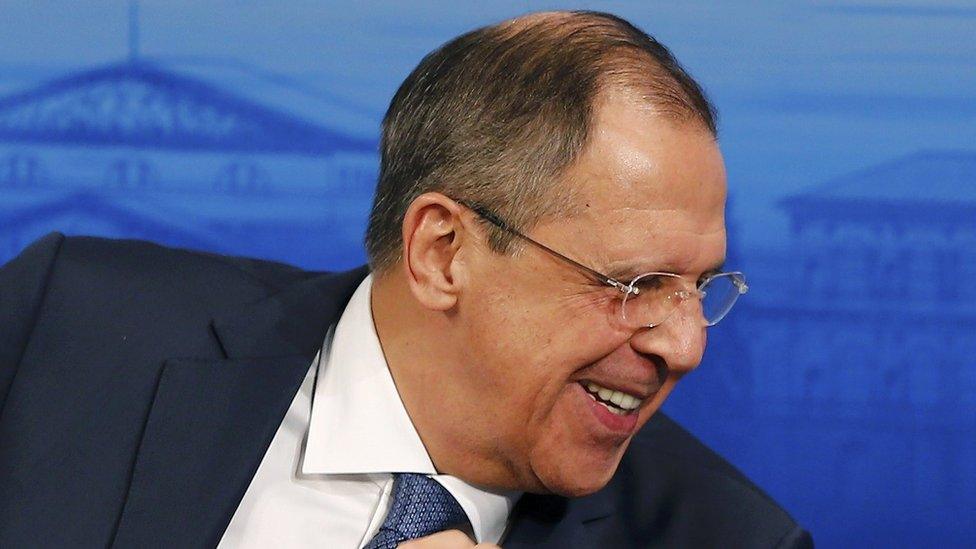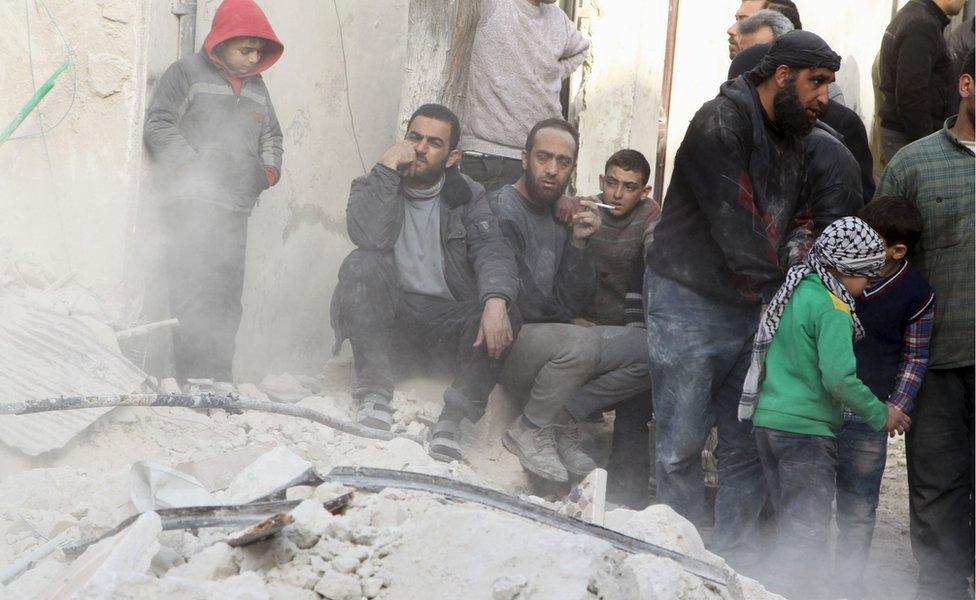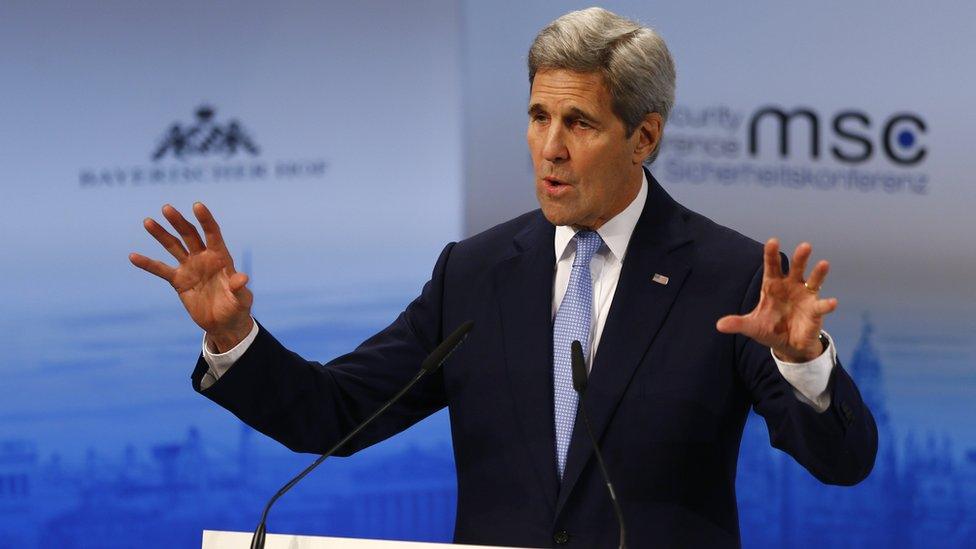Syria conflict: Value of Munich meeting hangs in the balance
- Published
The horrifying statistics that define Syria
"Is the message from Munich a message of continued fighting, or are we going to be capable, in the course of this year, of giving peace a chance?"
This was the question posed in the final moments of this year's Munich Security Forum by its chairman, Wolfgang Ischinger.
This year's Forum was all about war and peace and, like the famed Tolstoy novel, all about Russia.
Its principal setting is the divided and devastated Syrian city of Aleppo where Russia's intensive bombing is tilting the balance of power towards the Syrian military as it moves to encircle the rebel-held east.
Tens of thousands of Syrians, desperate to escape the frightening violence, have already fled towards the Turkish border.
No-one can be sure how this story will end. But Western and Arab backers of the Syrian opposition are alarmed and angry as the plot unfolds.
A crucial meeting, which brought together all the outside players in Syria's tangled conflict on the eve of the Forum, cast a long shadow over the three-day annual gathering, which usually focuses on trans-Atlantic relationships.
'Not Russia's problem'
Many kept discussing how Russia's Foreign Minister Sergei Lavrov was able to emerge from five hours of difficult talks last Thursday without yielding to demands to stop the Aleppo bombing.
Moscow is accused of mainly striking Western-backed opposition forces rather than terrorist groups including so-called Islamic State.
Sources say Russia's top diplomat argued that if other groups fighting alongside the extremists ended up in the bombers' sights, that wasn't Russia's problem.

Many people questioned how Russian Foreign Minister Sergei Lavrov managed to emerge from the meeting without having to suspend the bombing of Aleppo
Sixteen Arab and Western foreign ministers as well as international organisations sat around that table last Thursday.
They clinched what was, on paper, an ambitious agreement: a cessation of hostilities within a week, the delivery of urgently needed aid to besieged areas within days, and a call to return to peace talks that had broken down last month in Geneva.
But, no sooner was it hailed as a breakthrough, came the realisation that Russia's military campaign around Aleppo and other strategic areas would remain.
"How were the Russians allowed to do that?" a European defence minister fumed in the corridors of the elegant Bayerischer Hof hotel, which was fizzing with fury over Moscow's manoeuvres.
"Foreign ministers deal with words but we deal with the military consequences," he told me in a not so subtle jab.
Since the meeting, at least three hospitals and two schools in northern Syria have been hit in missile strikes, killing scores of people - attacks condemned by France and Turkey as war crimes. Russia has said it "categorically rejects" accusations of war crimes over the bombing of hospitals.
'Judgement and resolve'
"The Russians have all the cards," a Western defence official explained with a resigned nod to the Russians' expanding military presence in Syria since they unleashed their bombing last September and turned the tide of war in President Bashar al-Assad's favour.
Another observer spelt it out.
"In the space of just four months Russia went from nothing in the past 25 years to being the key player in Middle East power politics with military capabilities and the political will to back it up," explained a senior European diplomat attending the Forum.
"Gulf Arab states look at their allies and bemoan the fact that they don't deploy the same."

The Russian-Syrian government alliance has carried out intensive bombing in the Aleppo area
One of the clear messages which resonated in the Munich Forum was that Moscow's growing presence was also the consequence of Washington's absence.
"It isn't occurring because we lack power or influence or options to employ," thundered US Senator John McCain in the closing session.
"No, this comes down ultimately to our judgement and resolve," he said, implicitly criticising President Barack Obama's refusal to make any significant military intervention in Syria.
It was, for many, an echo of last year's Forum which was dominated by Russia's resort to military force in Ukraine including the annexation of Crimea and backing of separatist forces in the east of the country.
"Georgia in 2008 was Act One, Ukraine was Act Two, Syria Act Three," observed a Western diplomat.

Sources say some foreign ministers did push to put Aleppo on a list of besieged areas where bombing had to stop, so urgently needed humanitarian aid could be delivered.
But, strictly speaking, Aleppo is not yet besieged - unlike 14 other places completely or partially cut off by one warring side or another in a punishing conflict where food is deployed as a weapon of war.
"We had to give way on this," explains a senior UN official. "But if Russia and the Syrian military encircle and cut off the rebel-held east, it would be put on the list."
Europe's foreign policy chief Federica Mogherini told me Russia did not get a "blank cheque." She cited a "real turning point" that the US and Russian militaries would "coordinate and exchange information and share responsibilities" to ensure more accurate targeting.
'Road to nowhere'
But US Defence Secretary Ashton Carter is said to have baulked at that. The Pentagon wants to avoid giving Moscow any access to its intelligence gathering, and any boost in political capital.
Russian officials are putting the blame for the spiralling tension squarely on Washington and its allies.
Mr Lavrov accused the West of "outright provocation" in its insistence that "we will not negotiate until the violence is stopped". He called it a "road to nowhere".
President Assad has now chimed in to say "a ceasefire, if it happens, doesn't mean each party will stop using weapons". Leading opposition official Riad Hijab demanded in Munich why "the onus was on the opposition?"

It is a "hinge moment", said US Secretary of State John Kerry
And no sooner was the deal done, there were Saudi and Turkish warnings that they could send ground troops into Syria.
That provoked a strong rebuke from Russia's Prime Minister Dimitry Medvedev, who told the Forum it could lead to "permanent war".
Munich's message still hangs ominously in the air. Will the week ahead be one where Syria's story slowly moves toward a happier ending, or leads to an even more terrifying chapter?
It is, as US Secretary of State John Kerry put it, "a hinge moment".
And a lot of it hinges on Russia.

Munich Security Conference
The annual event is the world's largest forum for the discussion of security policy
First took place in 1963, when it was then called Internationale Wehrkunde-Begegnung
In the first few decades participants mainly came from Germany and the US and a few other Nato members, and the conference was dubbed a "transatlantic family meeting". Debates concentrated on Western policy within the overarching framework of the Cold War confrontation
When the Cold War ended participants from Central and Eastern European countries were also invited
Today more than 450 leaders and security experts from around the world attend.
